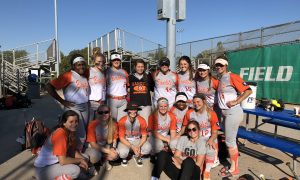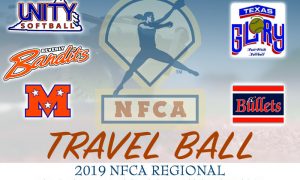Fueling Your Body for Top Performance
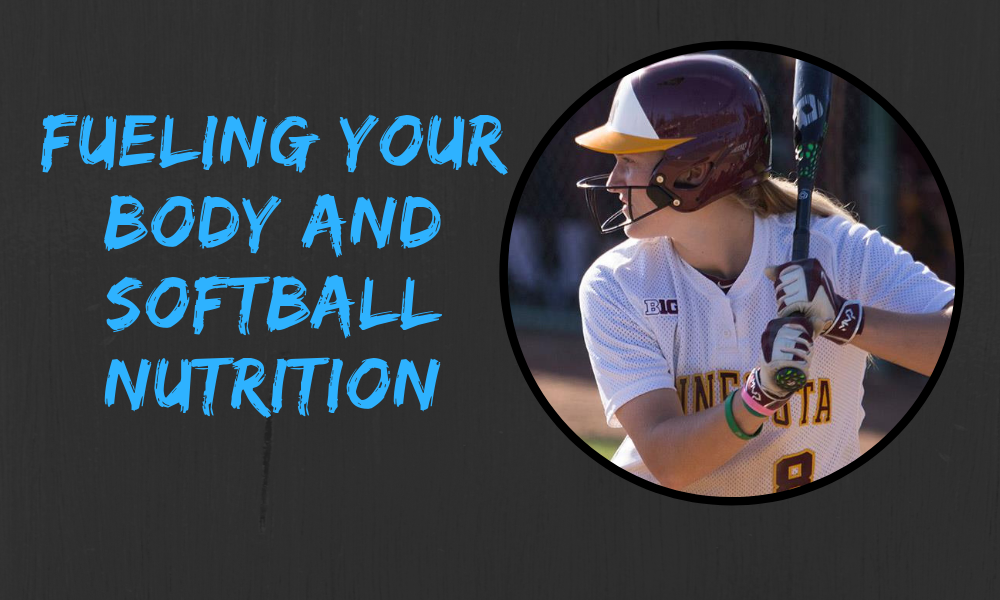
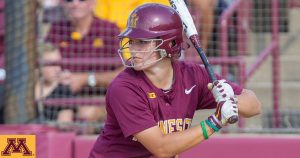 Let’s set the scene: it’s championship Sunday and you’re coming through the losers bracket which makes for a long day at the field. You have a game break and are hungry! You head to the concession stand and what are your options? Chips? Candy? Pop (soda for you non-mid-westerners)? We’ve all been there! So, how are you supposed to properly fuel your body so it can continue to perform at the highest level?
Let’s set the scene: it’s championship Sunday and you’re coming through the losers bracket which makes for a long day at the field. You have a game break and are hungry! You head to the concession stand and what are your options? Chips? Candy? Pop (soda for you non-mid-westerners)? We’ve all been there! So, how are you supposed to properly fuel your body so it can continue to perform at the highest level?
We talked to former University of Minnesota softball player, Kayla Wenner (’16), about this issue and her ideas on how to best approach softball nutrition.
Wenner, a Minnesota native, played for the Gophers from 2013-2016. She was named the team’s Freshman of the Year in 2013 and wrapped up her career with a breakout senior season in 2016. Wenner was also a multi-year Academic All-Big Ten and NFCA All-America Scholar Athlete selection and studied food science and nutrition through Minnesota’s acclaimed program.
—————————————————————
FPN: Can you tell us a little bit about you and what you are doing now?
KW: Right now I am in the middle of my dietetic internship through Sodexo. I am also doing my food service management rotation at the General Mills Headquarters in Golden Valley. I am doing my concentration in diabetes, and I am also currently getting my master’s in nutrition through an online program from the University of Rhode Island. When I’m not doing that I sleep and eat…maybe haha!
—————————————————————
FPN: You played travel ball and collegiate athletics – from a nutritional perspective what were both experiences like? And looking back, what are you biggest tips for players today?
KW: Both are really difficult to manage from a nutrition standpoint, and for various reasons. I think travel ball was more difficult because you’re at the field ALL DAY. It makes it difficult to get a proper meal in because you’re playing this game and then warming up for the next and it requires a lot of planning in advance to make good decisions with nutrition when you’re in that setting – I definitely did not when I was that age! College was difficult in the sense that it’s a lot of running around, which is similar to club ball, but 1. You’re on your own for meals, meaning YOU have to make the right decisions for your body and 2. You’re just physically and mentally exhausted, and when we’re tired it’s usually our first thought to get something fast, which isn’t typically the best choice.
My advice – plan ahead! My mom packed meals sometimes and it’s soooo much easier and much healthier when you can pack snacks from home. The food from the concession stand should not be an athlete’s main source of food no matter how delicious that taco in a bag looks. If you’re absolutely stressed for time and you need something, then absolutely get food from the concession; the idea is to have a majority of your intake from healthier options that will most likely come from a packed meal. This planning ahead is similar in a college setting. Know your schedule, know when you typically get hungry, and keep healthy snacks in your backpack or have options at home that are quick, it’ll make it easier to choose the healthier option.
—————————————————————
 FPN: When you are competing at tournaments, the days can get long and the food options at the concession stand are not always the healthiest. What are your tips for student-athletes and families to prepare for this in order to perform their best throughout a long weekend?
FPN: When you are competing at tournaments, the days can get long and the food options at the concession stand are not always the healthiest. What are your tips for student-athletes and families to prepare for this in order to perform their best throughout a long weekend?
KW: Like I said above, I think packing meals or knowing what’s in the area is important. Although we don’t want to rely on fast food, I feel there are more healthy options for fast food restaurants these days. Even if they’re not considered “fast-food”, you can get food fast, if that makes sense? Panera has some good options for sandwiches and salads, Chipotle can be a good option, or just using your best judgement in a restaurant like Chick-Fil-A. A lot of grocery stores have fairly decent to-go sections as well. Although, I would always recommend bringing your own food if possible, it’ll be better for you, less money spent and you won’t have to drive around looking for food.
—————————————————————
FPN: What should an “eating schedule” look like during these long tournaments and days leading up to them? How can you best prepare your body so you feel your best and are supplying it with what it needs to perform?
KW: Always eating a well-balanced diet is key, before, during and after a tournament. It is VERY important that these young women eat enough food! You’re doing a lot of activity during these tournaments and your body needs fuel to make it through and to also recover day to day. Carbohydrates are your friends and you need them, and athletics are not the place for low carb diet. You need energy to swing, pitch, throw, run and most importantly WIN! Carbohydrates will fuel you through that. Having a well-balanced meal the night before – 50% of your plate should be fruits/vegetables, 25% should be some sort of protein, and the other 25% should be a grain. Continuing this idea on throughout the playing day will let you prepare for the next game while recovering from the game before. Protein and carbohydrates should be top priority (typically fat gets carried along with other foods, so we don’t really need to worry about it). I know for us we used to warm up about 30-45 minutes before games – I think right before this would be an excellent time to have a granola bar, dried fruit, etc. to get some carbohydrates in your body for the best game!
—————————————————————
FPN: What is your take on “carbo-loading” for softball players?
KW: I don’t think carb-loading is appropriate for a softball athlete. The idea behind carb-loading is that you maximize the energy storage in your muscles for intense exercise, but this is really only done in professional athletes who train for very physically demanding sports (like marathon runners). Carb-loading takes days of precise training and diet to achieve. If you’re eating well, you’ll have more than enough energy stored up, and because softball really only has small bursts of quick energy, your body can replete these stores afterwards without any decline in performance.
—————————————————————
FPN: How can youth athletes best set themselves up nutritionally to be successful?
KW: Educate yourself! I’m biased to the idea of everyone meeting with an registered dietitian of course, but it’s genuinely very helpful! There’s so much misinformation out there, if you want to set yourself up to be successful from a nutrition standpoint, take the time to educate yourself. In high school, my mom and I met with a dietitian at our local grocery store who went through foods I was eating or that I liked, and we walked through the grocery store and talked about foods that would be best for me while fitting my preferences. It’s quite amazing how feeding yourself well will make exercise feel that much easier.
—————————————————————
FPN: Are there any online resources you would recommend for athletes/families to look into for more information into nutrition?
KW: The Academy of Nutrition and Dietetics has an awesome website with a lot of articles on different things, here is one on teen athletes and nutrition:
Today’s Dietitian is a magazine you can read online where their articles are written by registered dietitians about many different topics. Highly recommend both of these resources.
Just as a general FYI for information from the internet – choose articles, blogs, what have you that are written by a registered dietitian nutritionist. The registered part is key here. You could read this e-mail and call yourself a nutritionist – there’s no education requirement to call yourself a nutritionist, and I’ve read so many blogs and articles from “nutritionists” providing incorrect diet education. It’s horribly frustrating. If you cannot find an author, I would take that information with a grain of salt. Easiest way to get correct nutrition information is to meet with a registered dietitian!
—————————————————————
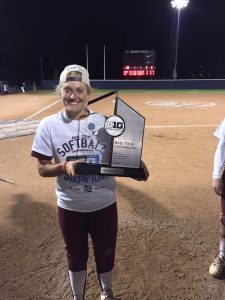 FPN: Talk to me about the importance of water and hydration? Everyone “knows” it is important but why? And just how important is it?
FPN: Talk to me about the importance of water and hydration? Everyone “knows” it is important but why? And just how important is it?
KW: HYDRATION! Oh my word, I wish I realized how important this was in college. I didn’t even understand how much easier it is to exercise when you’re actually hydrated. And I mean truly hydrated. We typically recommend 64oz for the average person, which is 2 liters per day. This is on average, so an athlete, who is sweating and running around not only needs, those 2 L, but needs to replace lost fluids. Most likely, they would need about 3 liters per day. Hydration is also something that you build up. You won’t be able to catch up in the middle of a tournament if you got there dehydrated and now you’re trying to chug a bunch of water. Carry a water bottle around, sip it throughout the day the week leading up to your tournament, and continue that same idea throughout games.
Your body is about 60% water, and it is used in thousands upon thousands of chemical reactions going on in our body. Breaking down food, breathing, and muscles contracting all need water. By the time you start to think, “Hey, I could use some water”, you’re already slightly dehydrated. So, before you even feel thirsty, you should be drinking water – you might be low on water without knowing it
—————————————————————
FPN: Do you have anything you’d like to add or that you think is really important to this discussion of nutrition for student-athletes?
KW: You don’t have to be restrictive and all foods can fit. Since you’re so active, you have extra calories you can eat! Such an awesome feeling. I think the common misconception with nutrition and eating well is that it’s bland and boring and you literally eat broiled chicken breast and green beans every day. Eat pizza, eat fries, eat ice cream – in moderation and along with healthy choices at other meals. The biggest thing for young female athletes is to eat enough and eat well. Think of your food as fuel when you’re going into a tournament.
I like to compare yourself as an athlete to a car (they also do in the article I listed above). You spend all this time and energy on making this car the fastest. Now you’re presented with two types of gas for your car. One is really cheap, it clogs your engine, and it doesn’t really work well; the other lets your car go as fast as it can without any issues, you can be at the top of your game. We’d all choose option number 2, so why do anything different with your body?
It also will instill lifelong habits you can continue after athletics, which is a really, really big deal.
—————————————————————
Big thank you to Kayla Wenner for sharing your time and knowledge with us! We hope you are able to take something away from this and help elevate your game and well-being to new heights!
A few minor updates were made 1/13/2019.

